GALLUP NEWS SERVICE
PRINCETON, NJ -- When USA Today asked what the subjects of his film "March of the Penguins" have most in common with humans, director Luc Jacquet answered, "They form couples and are faithful. It's the only way they can raise the chick under extreme conditions."
Jacquet's rendering of love-struck penguin couples struggling to bring their offspring into the world is touchingly humanlike. But marriage is often viewed as a declining institution in U.S. society. Indeed, Gallup trends show that the percentage of American adults who were married at the time of the survey has fallen from a high of 77% in the 1960s to an average of 53% since 2000. Simultaneously, the percentage of divorced Americans at the time of the survey has grown from 3% to 11%, and the percentage either single or living together has surged from 9% to 24%.
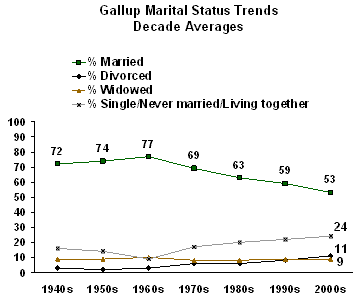
However, these data mask Americans' propensity to imitate their tuxedo-feathered friends in trying out marriage, at least sometime in their lives. Recent Gallup polling finds that nearly all U.S. adults -- 91% -- either have been married or plan to get married someday. Only 4% have ruled out marriage, while 5% are unsure or refuse to designate their marital status or intentions.
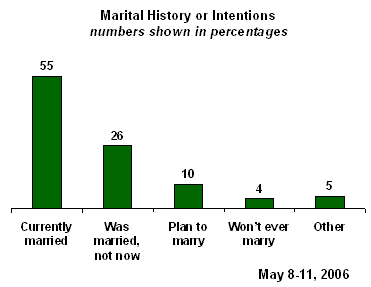
Why Marry?
While both are the marrying kind, people and penguins seem at variance when it comes to the reason for doing so. Just 37% of Americans say it is very important to them that an unwed couple legally marry when the couple has a child together. Many more Americans (65%) say it is very important for a couple to marry if the two are committed to spending the rest of their lives together.
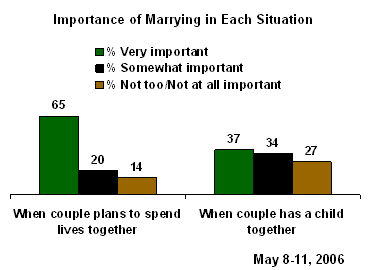
Relatively few Americans say it is not important to them whether people marry in each of these cases: only 14% say this with respect to couples spending their lives together, and 27% relative to couples having children. But in the latter case, a large segment says marriage is only somewhat important. The discrepancy in the percentage saying marriage is very important in each of the two situations (65% vs. 37%) indicates that to Americans, marriage is primarily a means of strengthening or sealing the bond for a couple, not a contrivance to facilitate child rearing.
Older Generation Has Different Perspective
While these are the overall results, not everyone agrees. In contrast to Americans under 65 years of age (32%), a majority of those 65 and older (58%) think it is very important for unwed couples to marry if they've had a child. Seniors are also more likely than younger adults to believe it is important that committed couples take marital vows (80% vs. 62%).
In fact, there are strong generational patterns to both questions that suggest the importance of marriage in U.S. society could be on the decline. A majority of those 18 to 39 (57%) say it is very important to them that couples committed to a lifelong relationship legally marry, but this lags far behind the 80% found among seniors. Also, only 3 in 10 of this younger group (30%) feels strongly about unwed couples marrying when they have children, versus 58% of seniors.
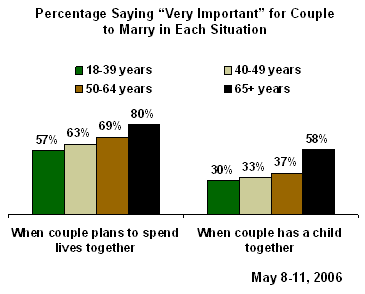
Other notable distinctions in attitudes about marriage are seen according to personal ideology. Most self-described conservatives (85%) say getting married is very important when the couple plans to have a lifelong relationship, but this falls to 54% among moderates and 43% among liberals. Similarly, nearly half of conservatives say marrying for the sake of children is very important, compared with 31% of moderates and 20% of liberals.
The Forecast for Marriage
Marriage is thought by some observers to be dying in Scandinavia, where extramarital cohabitation and having children outside of marriage are becoming the norm. Whether the United States goes the same route may largely depend on how U.S. social norms evolve (although government policies, such as tax incentives to marry, could also have an impact).
At the moment, there is an enormous gulf in attitudes between young adults and seniors about the morality of premarital sex: 79% of those 18 to 29 think this is morally acceptable, compared with only 42% of those 65 and older -- a 37 percentage-point gap. There is a similar generational gap (34 points) on the question of having children outside of marriage.
The views of those 30 to 49 and 50 to 64 tend to fall somewhere between these extremes, but the majority of these groups still agree with young adults that these behaviors are morally acceptable. This suggests that the more liberal social values young adults express today are likely to remain with them as they age.
At the same time, the sanctity of marriage as a monogamous relationship remains a universal value in American society. Only a small handful of Americans of any age group thinks either polygamy or extramarital affairs are morally acceptable.
|
% Saying Morally Acceptable |
|||||
|
National |
18-29 |
30-49 |
50-64 |
65+ |
|
|
% |
% |
% |
% |
% |
|
|
Divorce |
67 |
77 |
62 |
72 |
64 |
|
Sex between unmarried men and women |
59 |
79 |
60 |
61 |
42 |
|
Having baby outside of marriage |
51 |
67 |
54 |
52 |
33 |
|
Polygamy |
5 |
4 |
7 |
4 |
2 |
|
Married man and woman having an affair |
4 |
5 |
3 |
5 |
5 |
Divorce is widely viewed as acceptable among all age groups -- a practical perspective if nothing else, given that 28% of U.S. adults, according to the latest poll, have been divorced at least once. The percentage divorced is particularly high among those 50-64, an age group that is also more accepting of the morality of divorce.
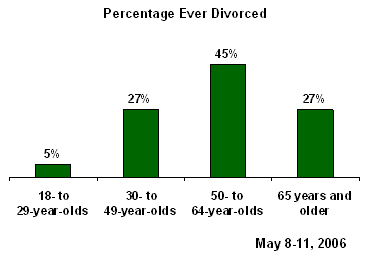
More Talk Than Action?
Young adults are highly tolerant of a couple's decision not to marry when they decide to live together or have a child. This doesn't mean they, themselves, will adopt these lifestyles, but the evolving cultural acceptance makes it much easier for them to make these choices. Will any remaining taboo against these lifestyles be lifted when today's seniors -- the grandparents of today's young couples -- are no longer around to pass judgment?
For the moment, most young adults (18 to 29) seem headed down a fairly traditional path of marriage. Three-quarters (76%) either are currently married, were previously married, or plan to marry someday. Another 13% are currently living together with a partner, and whether they ultimately marry or persist in avoiding this convention remains to be seen.
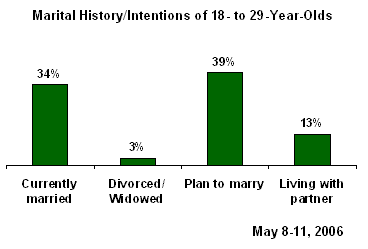
Survey Methods
These results are based on telephone interviews with a randomly selected national sample of 1,002 adults, aged 18 and older, conducted May 8-11, 2006. For results based on this sample, one can say with 95% confidence that the maximum error attributable to sampling and other random effects is ±3 percentage points. In addition to sampling error, question wording and practical difficulties in conducting surveys can introduce error or bias into the findings of public opinion polls.
46. How many different times have you ever been married?
|
|
|
|
Ever married/ |
|
% |
% |
% |
|
|
Never married |
19 |
-- |
3 |
|
One time |
60 |
75 |
71 |
|
Two times |
16 |
18 |
19 |
|
Three times |
3 |
4 |
4 |
|
Four or more times |
1 |
1 |
1 |
|
|
|
|
|
|
No opinion |
1 |
-- |
2 |
|
|
|
|
|
|
Mean |
1.1 |
1.3 |
1.3 |
|
^ Based on 886 adults who have ever been married or are living with a partner; ±4 pct. pts. |
|||
47. How many different times have you ever been divorced?
|
2006 May 5-7 |
All |
Ever |
Ever |
|
% |
% |
% |
|
|
Never divorced |
72 |
66 |
-- |
|
One time |
20 |
24 |
71 |
|
Two times |
7 |
9 |
25 |
|
Three times |
1 |
1 |
4 |
|
Four or more times |
* |
* |
1 |
|
|
|
|
|
|
No opinion |
* |
* |
-- |
|
|
|
|
|
|
Mean |
0.4 |
0.5 |
1.4 |
|
* Less than 0.5% |
|||
D14. Which of the following best describes your marital status: currently married, living together with a partner, widowed, divorced, separated, or never married?
|
|
2006 May 8-11 |
|
% |
|
|
Currently married |
55 |
|
Living together with a partner |
6 |
|
Widowed |
8 |
|
Divorced |
14 |
|
Separated |
1 |
|
Never married |
16 |
|
|
|
|
No opinion |
* |
|
* Less than 0.5% |
|
48. Do you think you will get married someday or do you think you will remain single?
BASED ON 116 ADULTS WHO HAVE NEVER BEEN MARRIED (EXCLUDES CURRENTLY LIVING TOGETHER)
|
|
Will get |
Will remain |
No |
|
2006 May 8-11 |
66% |
27 |
7 |
Next we have some questions about your own values on marriage.
Q.49-50 SPLIT SAMPLED
49. When a man and woman plan to spend the rest of their lives together as a couple, how important is it to you that they legally marry -- very important, somewhat important, not too important, or not important at all?
BASED ON 515 NATIONAL ADULTS IN FORM A
|
|
|
Somewhat |
|
Not |
|
|
2006 May 8-11 |
65% |
20 |
7 |
7 |
1 |
50. When an unmarried man and woman have a child together, how important is it to you that they legally marry -- very important, somewhat important, not too important, or not important at all?
BASED ON 487 NATIONAL ADULTS IN FORM B
|
|
Very |
Somewhat |
Not too |
Not |
No |
|
2006 May 8-11 |
37% |
34 |
17 |
10 |
2 |